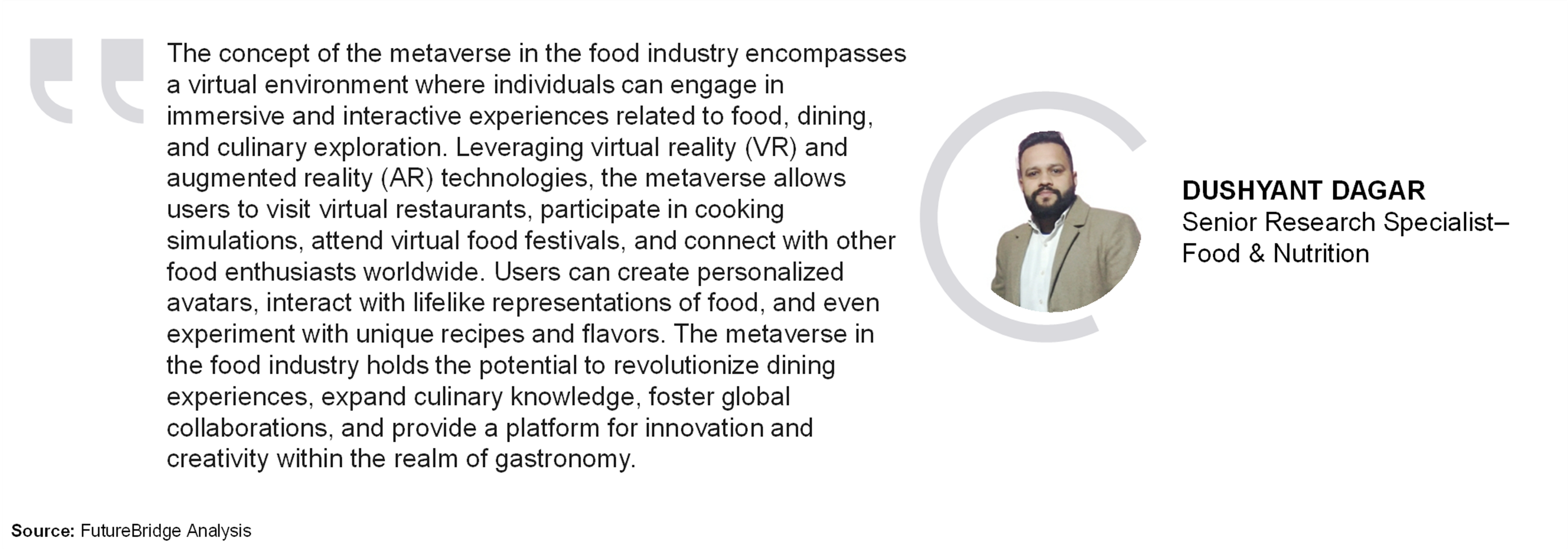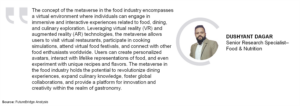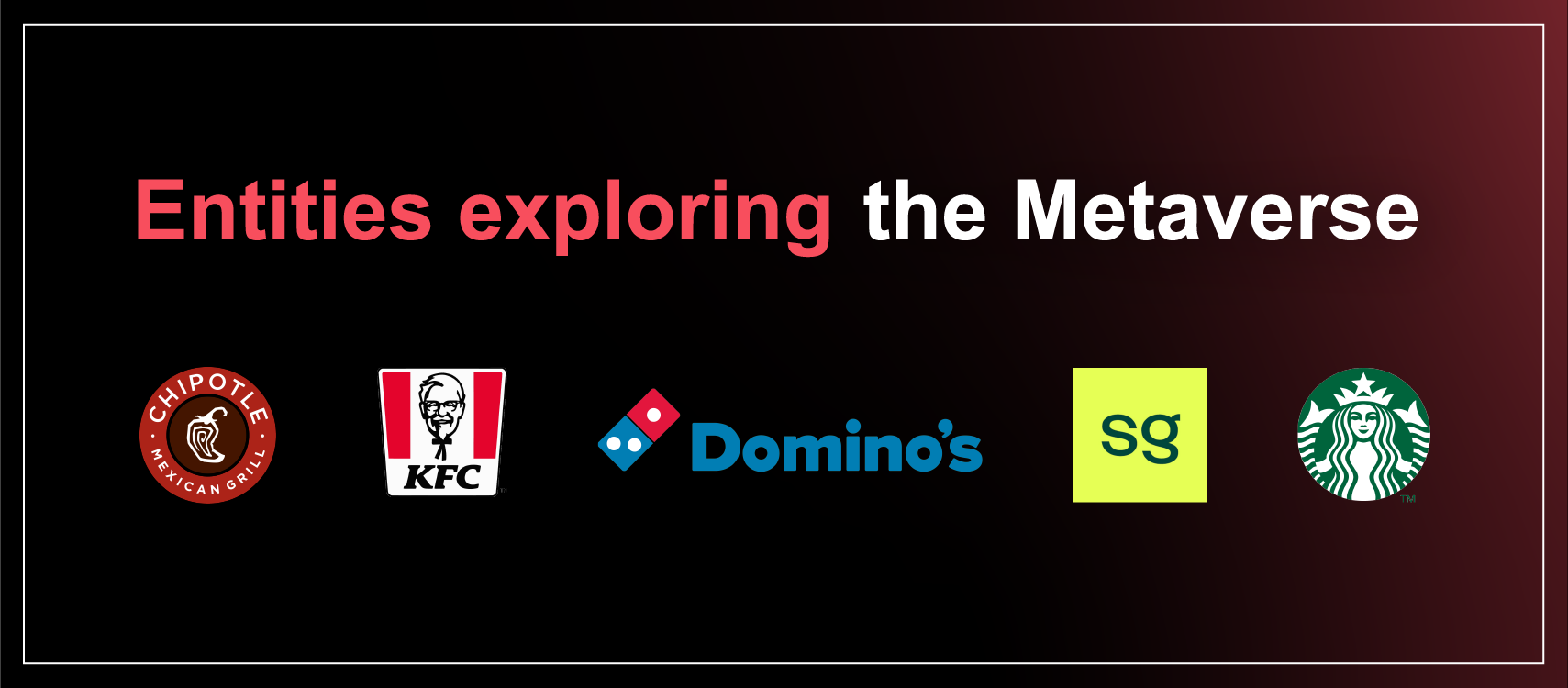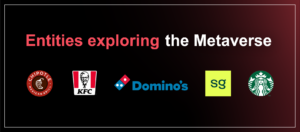Significant entities exploring the metaverse
Food companies such as Chipotle, KFC, Starbucks, Domino’s Pizza, and Sweetgreen are investing in the metaverse to tap into the growing trend of virtual experiences and digital interactions. The metaverse represents a virtual realm where people can engage in immersive and interactive experiences using virtual reality, augmented reality, and other technologies.
Metaverse provides customers with a real experience of their products, which aids in data exchange of ingredients such as their nutritional values, health benefits and allergens, processing, transport, and so on. Through immersive metaverse experiences, customers can virtually sample new dishes, explore innovative culinary concepts with delicious aromas, and even participate in interactive cooking classes with renowned chefs, all of which will foster stronger emotional connections with brands.
The collectable and experiential nature of Metaverse and NFTs in the food industry will create a new level of brand loyalty and excitement, ultimately driving significant sales growth.
A fast-casual Mexican restaurant chain utilizes the metaverse to create immersive virtual dining experiences. Customers can explore virtual Chipotle restaurants, customize their orders, and virtually interact with friends while enjoying their meals. The metaverse allows Chipotle to offer unique dining environments and engage customers in a new and innovative way. Using metaverse Chipotle offers social interactions and virtual loyalty programs to attract more customers.
A fast-food chain specializing in fried chicken has integrated the metaverse into its operations to provide virtual kitchen tours and interactive cooking experiences. Users can explore virtual KFC kitchens, learn about the cooking process, and even try their hand at preparing KFC’s signature dishes. This immersive approach allows KFC to educate and entertain customers while showcasing its cooking techniques and ingredients. Through this innovative integration of the Metaverse, KFC fosters a sense of community, encourages user-generated content, and strengthens brand loyalty among its customers.
Leverages the metaverse to offer virtual farm tours and ingredient-sourcing experiences. Users can explore virtual farms, learn about sustainable farming practices, and gain insights into the origins of the ingredients used in Sweetgreen’s salads. By integrating the metaverse, Sweetgreen aims to promote transparency, educate customers about their sourcing practices, and strengthen their commitment to sustainability. This innovative approach not only streamlines the ordering process but also boosts customer engagement and brand loyalty by offering a fun and interactive way to enjoy their nutritious offerings in the digital realm.
Global coffeehouse chain incorporates the metaverse to create virtual coffee shops and interactive barista experiences. Customers can visit virtual Starbucks locations, customize their drinks, and learn about different coffee brewing methods. The metaverse allows Starbucks to extend its reach beyond physical stores, providing customers with a unique and immersive coffee experience.
Popular pizza delivery chain utilizes the metaverse to enhance the ordering and delivery process. Users can enter virtual Domino’s restaurants, customize their pizzas, and track their orders in real time. Additionally, Domino’s integrates augmented reality (AR) features, allowing customers to visualize their customized pizzas before placing their orders. By leveraging the metaverse, Domino’s aims to make the ordering process more interactive and engaging. Domino’s might collaborate with social VR platforms to host virtual events, promotions, and even in-game advertising to engage with their audience. Embracing the Metaverse could potentially revolutionize the way customers engage with the brand, offering unique and unforgettable experiences in the digital realm.
Conclusion
Metaverse convergence with NFTs and the food industry would present a wealth of opportunities for culinary innovation, immersive dining experiences, and enhanced consumer engagement. From virtual restaurants and limited-edition recipes to sustainable farming and community-oriented platforms, the metaverse offers a digital playground for food enthusiasts, entrepreneurs, and creators alike.
Nonetheless, like any advanced technology, metaverse also comes with its share of challenges that include:
- Enabling connectivity and infrastructure requirements to support uniform and secure interactions between virtual and physical environments
- Seamless interfaces for customers and consumers
- Secure and safe virtual food representations to consumers
- Health-related parameters interactions as per consumer preferences
- High standards of quality parameters to prevent foodborne illnesses or allergic reactions
To overcome these challenges collaborative efforts are required from technology developers, food businesses, and regulatory bodies to create a safe, inclusive, and seamless Metaverse integration that enhances the overall food industry experience. Metaverse is set to offer immense opportunities in the food and nutrition industry. It is, however, imperative to enable intelligent solutions to deliver agility throughout the food value chain and ensure a positive impact on consumers.








































